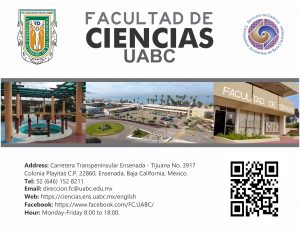Faculty history

The Faculty of Sciences of the Autonomous University of Baja California officially began its academic activities on June 21, 1977, with a degree in Biology and under the name of the Higher School of Biological Sciences. One year later, on November 18, 1978, the University Council approved the opening of the Degree in Physics. In the summer of 1982 the first Generation of Biologists graduated and in the summer of 1983 the first Generation of Physicists graduated.
In 1984, the first week of Biology was celebrated on May 3 to 6, in 1985, on November 13 to 15, the First Regional Exhibition of Mushrooms and Lichens of B.C.
In 1986, on November 27, the University Council approved the change of name of the School; Higher School of Biological Sciences by Higher School of Sciences, simultaneously being born the degrees in Computational Sciences and Applied Mathematics. For 1989, the creation of the Master in Management of Arid Zones Ecosystems was approved with what was called the Faculty of Sciences and the following year the first generation entered in the summer. In the winter of 1990, the first generations of Graduate in Computer Science and Graduate in Applied Mathematics graduated.
In January 2007, the Faculty began the area of Nanotechnology with a Master’s and Doctorate in Science and Engineering in Nanotechnology, as part of the postgraduate course in Science and Engineering (MyDCI) at the UABC. Currently, the Faculty of Sciences has a faculty of 43 full-time academics and the academic program of the Faculty of Sciences of the UABC is made up of four degree programs: Biology, Physics, Computational Sciences and Applied Mathematics, in the state of Baja California said careers can only be studied at the Faculty of Sciences. For its part, the postgraduate degrees available to the Faculty are: the Master’s Degree in Management in Arid Zones Ecosystems, which serves national and foreign students; the Master and Doctorate in Sciences and Engineering with a specialty in Nanotechnology and computing, which is a unique program in Mexico, which helps to strengthen cooperation ties with various national institutions and the rest of the world. In addition, there are other postgraduate courses shared between the Faculty of Sciences, the Faculty of Marine Sciences and the Institute of Oceanological Research, such as the Specialty in Environmental Management and the Doctorate in Environment and Development.
In the academic unit, the student is offered an appropriate academic and scientific environment, since in addition to having the necessary facilities and equipment that favor teaching and research, there is the possibility of interacting with other technical and scientific disciplines that are taught in the same campus or taught in nearby institutions such as CICESE and UNAM.
Mission
The mission of the Faculty of Sciences of the Autonomous University of Baja California is to train professionals of excellence and a highly competitive level, capable of applying their knowledge and skills to face and solve the challenges of the current and future scientific environment.
The Faculty of Sciences promotes scientific research in its different areas. In addition, it seeks to generate knowledge and extend it to the community, taking it to its application in the scientific, academic and social fields. All this in order to improve the quality of life in the local, regional, national and international environment. Finally, it fosters cultural values, ethical sense, social responsibility and respect for the environment at every step, through the extension of culture, the dissemination and dissemination of knowledge.
Vision
The vision of the Faculty of Sciences is to be an institution recognized for the competitiveness and comprehensive training of its graduates, noted for the quality and validity of its study plans that respond to the demand of the scientific field of the various sectors of society and of the industry in the local and national environment.
In the teaching activity, it seeks to have high levels of training of academic staff, with an increase in the number of teachers with a master’s degree and doctorate, taking advantage of the links and agreements with sectors dedicated to science for the training and constant updating of academics, which has a favorable impact on students, thus contributing to scientific and intellectual production based on the new educational model.
The student of the Faculty of Sciences, in addition to its competitive value, is highlighted by its value that it assigns to ethical conduct, permanent effort and commitment to respond to the changing realities of its environment.
With this vision, committed to having the accreditation of the study programs of the careers and certificates, the collective definition of strategic programs is intended, within the framework of the new paradigms and considering the current state of opportunities, strengths and weaknesses, to channel them to the realization of their mission.

















